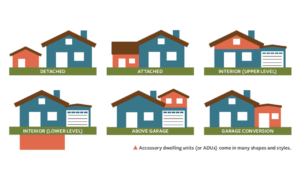
Rhode Island recently passed legislation to expand the opportunity for homebuyers or current homeowners to build an Accessory Dwelling Unit. ADUs can be a big help for a family, letting older members – like parents and grandparents – live beside younger generations while still maintaining independence. ADUs also let younger adults, like recent college grads, be near family while having their own space. Or the unit can become a rental option for the homeowner – though the law prohibits short-term rentals.
Whatever you decide to use it for, ADUs can increase your property value and help make the most out of your home.
What are ADUs?
ADUs are smaller, independent residential units located on the same property as a primary single- or multi-family home. They come in various forms; the types that can be financed through RIHousing’s loan are:
Attached ADUs: Units built as an addition to the main house, often with a separate entrance.
Interior ADUs: Units created within the main house, such as a finished basement.
Rhode Island now allows homebuyers and current homeowners to build an ADU on their owner-occupied property- if they meet certain criteria. Each town may have its own specific regulations, so it’s best to consult a qualified contractor who is familiar with the local requirements.
Frequently Asked Questions
What is an ADU? According to Rhode Island law an ADU is a residential living unit on the same lot where the principal use is a legally established single-family dwelling unit or multi family dwelling unit.
An ADU provides complete independent living facilities for one or more persons. It may take various forms including, but not limited to: a detached unit; a unit that is part of an accessory structure, such as a detached garage; or a unit that is part of an expanded or remodeled primary dwelling.
Who can live in an ADU? Anyone. There are no restrictions on who can reside in an ADU. It does not have to be a family member.
What does “By Right” mean? In Rhode Island, it refers to a use that is specifically permitted in a particular zoning district
Does the owner of the property need to live in the ADU or the main house No, there are no owner occupancy requirements for ADUs.
What specifics around size and setbacks are in the law?
- A one bedroom ADU can be up to 900 sq ft or 60% of the main dwelling square footage, whichever is less.
- A two bedroom ADU can be up to 1,200 sq ft or 60% of the main dwelling square footage, whichever is less.
- Municipalities can allow larger ADUs but they can’t set a maximum size that is less than these.
- Municipalities are not allowed to Impose dimensional requirements or other development standards on ADUs that in any instance exceed the requirements for an accessory structure in the same zoning district.
- ADUs are subject to all setbacks as any other accessory structure.
Can local zoning authorities overide statewide provisions? State law supersedes local authority.
Does the law require off-street parking for the ADU resident(s)? One off street parking spot per bedroom is required for ADUs.
Can an ADU become a short-term rental after the parents I built it for are no longer occupying it? No, ADUs shall not be offered or rented for tourist or transient use or through a hosting platform at any time. Transient use is defined by less than 30 days.
For information specific to where you plan to add an ADU, contact your municipal planning department. Find local contact information here.